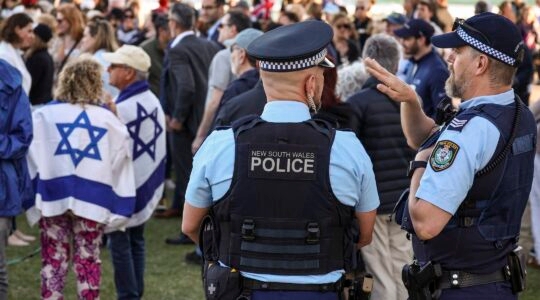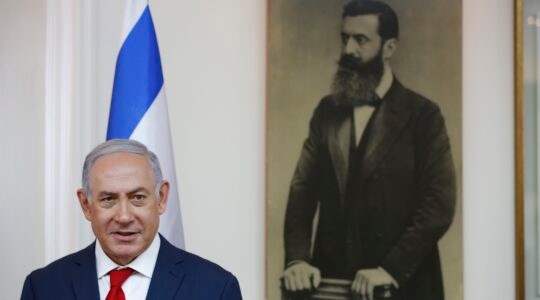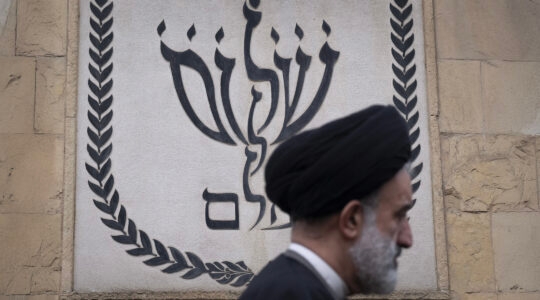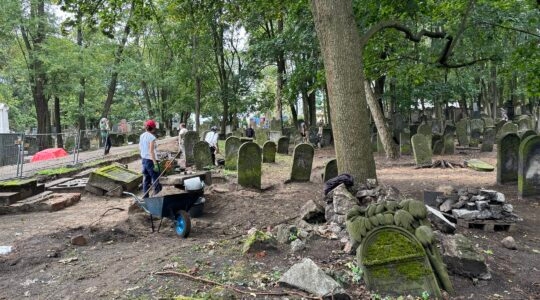(JTA) — Ahead of the Jewish New Year, four Jewish communities in the former Soviet Union celebrated the opening of synagogues in an effort to boost cultural and spiritual activities for congregants or commemorate Jewish heritage.
Of the synagogues that were opened in recent weeks in Russia, Ukraine and Lithuania, the most unusual was the reopening of a blue wooden structure that is the oldest known synagogue in Birobidzhan. The Beit Tshuva synagogue in the capital of Russia’s Jewish Autonomous Region underwent extensive renovations.
Birobidzhan is the capital of an area established in 1934 by Joseph Stalin in Russia’s Far East on the border with China in a failed bid to compete with the Zionist project in prestate Israel.
Established in 1986 amid the lifting of anti-religious policies in the former Soviet Union, the synagogue quickly fell into disrepair as Jews began leaving the area for Israel and the West following the breakup of the communist empire. Built on swampy soil that is exposed to extreme temperatures, it became a hazardous ruin.
But a local entrepreneur decided to fund its restoration, the news site DV Novosti reported last week. On Sept. 7, a few dozen locals, many of them non-Jews who had never seen a functioning synagogue before, attended the rededication ceremony, the news site reported.
Today, Jews account for less than 5 percent of the 175,000 residents of the Jewish Autonomous Region, which is located 450 miles west of the Japanese coastline.
Rabbi Eli Riss, a Chabad emissary who services the local Jewish community, blew the shofar in the renovated synagogue as locals observed.
Additionally, a new synagogue was inaugurated with money from the Uzbekistan-born billionaire Lev Leviev in the affluent Moscow suburb of Novye Veshki, located 10 miles north of the nearest synagogue. The diamond magnate attended the introduction of a Torah scroll into the small shul, which is tastefully decorated but has only 30 seats, the STMEGI group representing Russian-speaking Mountain Jews reported earlier this month.
Last week in Dnipro, a city in eastern Ukraine that used to be called Dnipropetrovsk, the local Jewish community reopened the very first Jewish house of prayer ever built there. The community is one of Ukraine’s strongest with thousands of members, as well as schools, a matzah factory and a Torah scroll workshop.
Known as the Alteshul, or Old Synagogue, it was established in the late 19th century, but its interior was ruined in the 1990s during renovations that were meant to salvage the structure from collapse. The interior was restored based on paintings of the synagogue’s interior and writings describing it.
In July, a historic synagogue that was built in 1823 was reinaugurated in the Lithuanian city of Joniskis, 140 miles north of the capital Vilnius. The Joniskis population was nearly 50 percent Jewish before the Holocaust, when 95 percent of Lithuania’s 225,000 Jews were murdered. The city had three synagogues. Only two of them, the restored one, which is known as the White Synagogue, and the nearby Red Synagogue, remain standing today.
Currently no Jews live in Joniskis, but members of the small Jewish community of Siauliai, a nearby city, attended the rededication ceremony in July, when the ambassador of the State of Israel in Lithuania, Amir Maimon, affixed a mezuzah to the renovated synagogue’s door frame, the Jewish Community of Lithuania wrote in a report of the ceremony.
JTA has documented Jewish history in real-time for over a century. Keep our journalism strong by joining us in supporting independent, award-winning reporting.





